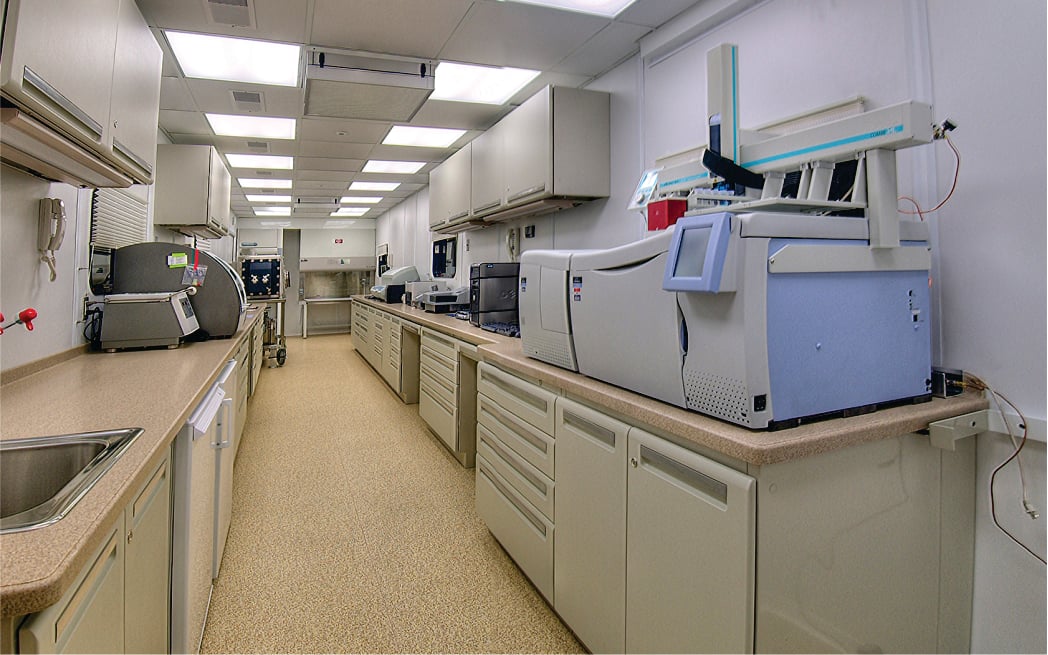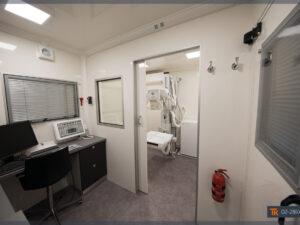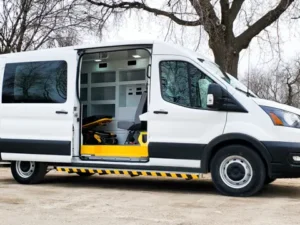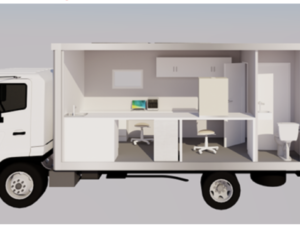Description
In the demanding realms of field research, emergency diagnostics, environmental monitoring, and industrial testing, the capability to perform precise analytical work at the point of need is a critical strategic advantage. Infinity Chassis Units stands as a premier engineering and manufacturing authority in the development of sophisticated, self-contained Mobile Laboratory solutions. We design and build specialized vehicles and containerized modules that transcend the limitations of fixed-site facilities, delivering controlled, fully-equipped laboratory environments directly to remote sampling sites, disaster zones, community health centers, and industrial locations. Each mobile laboratory vehicle we produce is engineered to uphold stringent scientific standards, ensuring the integrity of samples, the accuracy of results, and the safety of personnel. We provide research institutions, government agencies, and commercial laboratories with a turnkey platform for reliable, immediate, and compliant scientific operations in any environment, effectively bridging the gap between the field and the bench.
Vehicle & Trailer Platform Options: Configurable Foundations for Science
We offer a scalable portfolio of mobile platforms, each engineered to provide the optimal balance of mobility, payload capacity, and interior volumetric space required for specific scientific workflows and operational terrains.
Van-Based Mobile Laboratory Vehicles: Utilizing robust, high-roof chassis such as the Mercedes-Benz Sprinter, Ford Transit, MAN, and Iveco, these units offer exceptional maneuverability for rapid response and urban deployments. A mobile laboratory van is engineered for applications such as mobile water quality testing, food safety inspections, or point-of-care medical diagnostics, where agility and the ability to navigate tight spaces are paramount. Despite a compact footprint, the interior is maximized through custom ergonomic design to house essential benchtop instruments and sample processing areas.
Trailer-Based Mobile Laboratory Units: Offering superior flexibility and cost-efficiency, our mobile laboratory trailer solutions provide a dedicated laboratory space that is independent of a propulsion system. This platform allows the lab to be stationed semi-permanently at a site while the tow vehicle is used for other logistical tasks. Trailers offer greater interior width and length for a given investment, making them ideal for more extensive analytical setups required for environmental soil analysis, agricultural testing, or longer-term public health surveillance campaigns.
Containerized Laboratory Modules: For the highest level of equipment density, environmental stability, and durability, our 20ft and 40ft containerized laboratory solutions are the definitive choice. These modules are engineered to house complex instrumentation, Class II biosafety cabinets, fume hoods, and multiple analyst workstations. They are designed for interconnection to form larger laboratory complexes and can be deployed permanently or relocated as project needs evolve, providing a fixed-facility standard of operation with inherent logistical mobility.
Interior Laboratory Layout & Optimized Scientific Workflow
The interior architecture of an Infinity Mobile Laboratory is meticulously planned according to the principles of efficient laboratory workflow, contamination control, and analyst safety. Our designs implement a logical unidirectional workflow, typically zoning the space into dedicated areas: a sample intake and logging station, a sample preparation zone, a core analysis zone with instrument benchtops, a dedicated area for containment equipment (e.g., biosafety cabinet), and a data management station. This zoning minimizes cross-contamination between raw samples and processed materials and ensures a smooth, efficient progression from sample receipt to data generation. All laboratory-grade workbenches & cabinetry are custom-fabricated and securely anchored to withstand transit vibrations, with ergonomic heights and depths designed for analyst comfort during extended operational periods.
Laboratory Equipment Integration & Sample Management
The scientific utility of a mobile laboratory for sale is defined by the secure, stable, and functional integration of its analytical instruments. Our engineering team specializes in designing custom mounting solutions, vibration-dampening platforms, and dedicated utility feeds for a wide array of equipment, from centrifuges and microscopes to PCR machines, spectrophotometers, and gas chromatographs. We integrate specialized containment and safety equipment, including ducted or ductless fume hood or biosafety cabinet integration, with all necessary electrical and airflow considerations engineered into the vehicle’s core systems. Critical to many operations, we also incorporate precise refrigeration & sample storage solutions, including medical-grade refrigerators, freezers, and cryogenic storage, all with dedicated power protection to maintain sample integrity throughout the chain of custody.
HVAC & Precision Environmental Control Systems
Maintaining a stable, contaminant-free interior environment is non-negotiable for instrument performance, assay validity, and personnel safety. Our units are equipped with a laboratory HVAC with HEPA filtration system that provides precise, independent control over temperature, humidity, and particulate levels. This system is designed to manage the significant heat loads generated by analytical instruments while providing the necessary air changes per hour for safety and comfort. For labs handling volatile chemicals or biological agents, the HVAC design is integrated with the exhaust requirements of fume hoods and biosafety cabinets to maintain negative or positive pressure zones as required, ensuring no cross-contamination between the lab interior and the external environment or between different internal zones.
Robust Electrical & Redundant Power Systems
The operation of sensitive analytical instrumentation demands clean, stable, and uninterrupted power. Our electrical systems are engineered to laboratory-grade specifications. The architecture is built around a high-capacity pure sine wave inverter, a deep-cycle battery bank, and an automatic transfer switch, supported by a primary onboard generator & UPS system. The Uninterruptible Power Supply is critical, providing seamless bridge power during generator start-up and protecting equipment from harmful voltage fluctuations that could damage sensitive electronics or disrupt long analytical runs. Power distribution panels provide dedicated, isolated circuits for high-draw instruments, containment equipment, and climate control systems, preventing electromagnetic interference and ensuring each system receives power within strict tolerances.
Specialized Water & Waste Management Systems
Laboratory operations require controlled water access and responsible waste containment. Our designs incorporate fresh & waste water tanks sized for the intended operational duration between refills and servicing. The fresh water system may include filtration or deionization units for experiments requiring purified water. The waste management system is critically engineered with separate, clearly marked containment for different waste streams: neutralized chemical waste, bio-hazardous liquid waste, and general greywater. All waste tanks are constructed from chemically resistant materials and are easily accessible for safe discharge at approved facilities. This responsible design is fundamental to operating a sustainable and environmentally compliant mobile laboratory vehicle in field conditions.
Integrated Data, Telemetry & Connectivity Systems
The value of field analysis is realized through timely data reporting and integration. Our laboratories are engineered as connected scientific nodes. We incorporate robust telemetry & remote data transfer capabilities, including dual cellular modems with external antennae, satellite internet options, and secure, networked Wi-Fi. This allows for the real-time transmission of analytical results to central databases, remote monitoring of instrument performance and environmental conditions (temperature, humidity, power status) via telemetry, and live video consultation with off-site senior scientists. Integrated data management workstations facilitate on-board analysis and reporting, ensuring that decision-makers receive critical information without delay.
Compliance with Laboratory Standards & Safety Regulations
Infinity Chassis Units designs every Mobile Laboratory to facilitate compliance with relevant international standards for laboratory safety, electrical installations, and mobile workplaces. Our engineering incorporates guidelines from bodies such as ISO/IEC 17025, the CDC/NIH Biosafety in Microbiological and Biomedical Laboratories (BMBL), and relevant occupational health and safety administrations. We prioritize the use of chemical-resistant surfaces on all workbenches and splash zones, secure storage for hazardous materials, ergonomic design to prevent analyst injury, and integrated safety equipment including eyewashes, fire suppression, and emergency ventilation. While final certification is specific to the lab’s application and local jurisdiction, we provide a comprehensive technical dossier to support the accreditation process, detailing material specifications, safety system layouts, and engineering validations.
Application & Diverse Use-Case Deployment
Our mobile laboratories serve a vast spectrum of scientific and industrial missions. Research institutions and universities deploy them for ecological studies, archaeological fieldwork, and atmospheric research. Environmental agencies utilize them for real-time pollution monitoring, hazardous material spill response, and water source testing. Medical and public health laboratories use them for disease outbreak investigation (e.g., COVID-19, Ebola), population health screening, and vaccine efficacy studies in remote trial locations. Industrial testing companies employ them for on-site quality control in agriculture, mining, and manufacturing, while government laboratories leverage them for forensic science, food safety enforcement, and border security diagnostics.
Global Delivery, Installation & After-Sales Support
We manage the complete international supply chain for our global delivery & after-sales support. Our turnkey export & installation support includes professional crating for sea or air freight, comprehensive customs documentation, and logistical coordination to the destination port. We offer on-site commissioning services where our engineers verify all laboratory systems—environmental control, safety equipment, instrumentation interfaces, and data connectivity—are fully operational. Furthermore, we provide detailed analyst and maintenance training. Our after-sales support includes access to technical schematics, a dedicated spare parts inventory, and ongoing remote technical assistance to ensure the long-term reliability and productivity of your mobile laboratory investment.
Frequently Asked Questions (FAQ)
What is the typical price range for a new mobile laboratory van?
The mobile laboratory van price varies significantly based on the chassis, level of equipment integration, and complexity of the environmental control systems. A basic van for sample collection and simple tests starts at a different point than a van equipped with a biosafety cabinet, advanced instrumentation, and redundant climate control. We provide detailed, transparent quotations following a technical consultation to define your specific analytical and operational requirements.
Can your mobile laboratories achieve biosafety level (BSL) 2 or higher containment?
Yes, we engineer laboratories specifically for controlled environments. We can design and build mobile laboratory units that meet the physical containment requirements for BSL-2 operations, incorporating Class II biosafety cabinets, sealed surfaces, directional airflow, and appropriate waste decontamination systems. Designs for higher containment levels (BSL-3) are complex and require extensive collaboration to meet specific national guidelines.
How are heavy or sensitive instruments like GC-MS or PCR machines secured during transit?
We employ a multi-faceted approach: custom-fabricated, vibration-dampening mounting platforms that bolt directly to the vehicle’s reinforced floor structure; integrated restraint systems with adjustable braces; and, where necessary, shock-absorbing isolator feet for the instrument itself. This ensures that even sensitive equipment remains calibrated and undamaged during travel over rough terrain.
What are the options for laboratory water supply and purity?
Standard configurations include a pressurized freshwater tank for general use and sinks. We can integrate multi-stage filtration systems, deionization (DI) units, or even compact reverse osmosis (RO) systems to produce Type II or Type III laboratory-grade water on-demand, with dedicated storage tanks for the purified water to support specific analytical protocols.
How is temperature-sensitive reagent and sample storage managed during power transitions?
All refrigeration & sample storage units are connected to the vehicle’s UPS system, providing uninterrupted power during the brief switch between generator cycles or external shore power. The UPS is sized to maintain these critical appliances for a sufficient duration to allow for backup generator start-up, ensuring no loss of temperature control occurs during any normal or contingency power event.
What is the lead time for a custom containerized laboratory module?
Lead times for a containerized laboratory are project-dependent but typically range from five to seven months from order to shipping. This timeline encompasses container procurement, structural modification, interior fit-out with specialized surfaces and cabinetry, installation of complex HVAC and electrical systems, equipment integration, and comprehensive factory acceptance testing (FAT). A detailed project plan is provided upon contract initiation.





